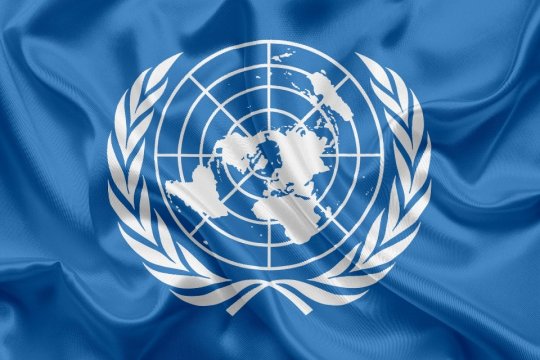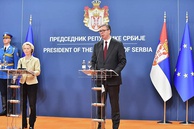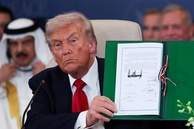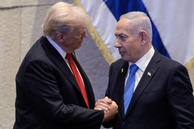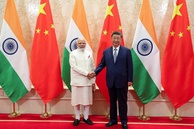On its 75th anniversary and amid the global COVID-19 pandemic, the United Nations has for the first time convened world leaders mainly in an online format to seek action and solutions for a world in crisis.
The UNO’s predecessor, the League of Nations, wrapped up its work with the outbreak of World War 2, but the further the start of the present United Nations slides back in history, the more skeptical assessments of its performance are being heard today. How come?
The United Nations Organization was created by the victorious nations shortly after the end of the Second World War, but the idea of creating a new international organization tasked with maintaining global peace and security was actually floated by members of the anti-Hitler coalition even before the war was over. During their August 14, 1941 meeting at the British naval station Argentia (Newfoundland), US President Franklin Roosevelt and British Prime Minister Winston Churchill inked the Atlantic Charter, which defined the two countries’ goals in the war against Nazi Germany, and outlined the first sketches of the post-war world order. The Soviet Union joined the declaration on September 24 of that same year. On January 1, 1942, representatives of 26 Allied countries endorsed the Atlantic Charter and signed the United Nations Declaration. Welcomed as the idea of creating a new organization was by everyone, however, there still were numerous disagreements regarding its tasks, goals and powers.
At a conference held in Moscow on October 19-30, 1943, the foreign ministers of the USSR, the US and Great Britain (Vyacheslav Molotov, Cordell Hull and Anthony Eden), signed the Declaration of Four Nations on General Security (it was also signed by China’s ambassador to the USSR Fu Bingchang), where the parties pledged to fast-track the creation of an international organization to maintain peace and security. The final agreement on the creation of the United Nations Organization was reached in March 1945 during the Yalta Conference by the leaders of the three Allied Powers – Josef Stalin, Franklin Roosevelt and Winston Churchill.
It was established that the UN would be based on the principle of unanimity of the great powers - permanent members of the Security Council with a veto right. Harry Truman, who succeeded Franklin Roosevelt, who died in April 1945, was openly critical of the agreement, but during a conference in San Francisco, where Soviet and US representatives locked horns over a number of issues pertaining to the UN Charter, the Soviet position prevailed. The sides eventually reached a compromise whereby the UN General Assembly could discuss any issues, but did not have the right to take decisions binding on the UN member states.
On June 26, 1945, representatives of 50 countries met in San Francisco to sign the UN Charter. On October 24, 1945, the Soviet Union became the 29th state to have submitted the instrument of ratification, thus securing the necessary number of votes for the Charter’s entry into force. Since 1948, October 24 has been marked as United Nations Day.
The status of the United Nations Organization, paid for by tens of millions of lives perished in World War II, went unquestioned for quite some time, ensuring for more than half a century peace in Europe and a relatively predictable situation globally. Over time, however, even the most durable world order is bound to be put to a test.
At the turn of the 1990s, the bipolar system of international relations and the Cold War were replaced by a new world order based on the political and economic predominance of the United States and its closest allies. By historical standards, however, this period proved pretty short-lived since the world is too complicated to unconditionally kowtow to the principles of the Washington Consensus. By the close of the 20th century and the start of the 21st, new centers of power and integration projects began to emerge, initiated by countries in Eurasia and Latin America.
Serious doubts about the reliability of the existing system of international security appeared already in 1999 with NATO’s enlargement to the east to incorporate Hungary, Poland and the Czech Republic – the first such process since the end of WW2. In that very same year, the forces of the North Atlantic Alliance, sidestepping the UN Security Council, launched bombing raids against Yugoslavia, thus throwing in question the entire system of post-war treaties. Since then, almost every US-initiated military operation in the world has been conducted illegitimately and classified by the UN Security Council as an act of aggression and condemned by both Russia and China, which insist that any use of force in international relations, be it political, economic or military, should come exclusively as a result of consensus of all members of the Security Council.
The veto right by a permanent member of the Security Council to block any decision, even if it is approved by all other members, remains the backbone of the entire system of international security. Everyone understands this, but not everyone is ready to come to terms with it.
The UN’s presence in the world after the end of the inter-bloc confrontation has significantly increased with its mandate transcending military aspects and now including humanitarian and social issues.
However, the world is facing the growing threat of numerous conflicts flaring up that can’t be resolved without a consensual decision by the key UN member states which, in turn, has proved to be extremely hard to achieve. It's not just about the five permanent members of the UN Security Council, as even the content of international documents is being disputed now. Who would possibly object to the need to combat the activities of terrorist and extremist organizations? And still, practice shows that the term "terrorism" carries a different meaning for European countries and, for example, those in the Middle East. As a result, UN Security Council resolutions on the settlement of contemporary conflicts in this region are actually ignored. Civil wars in Libya and Syria, as well as the extremely difficult situation in Iraq, caused to a large extent by the interference of the United States and its allies, as well as by the activities of network extremists, have added to the decades-long Palestinian-Israeli conflict. Adding to this is the rising threat posed by drug and cyber terrorism.
With the situation being as it is, the United Nations is facing a growing wave of criticism. The organization has been criticized before - in 1993 the UN mission in Somalia fell though, and in 1994, the UN failed to prevent genocide in Rwanda, stop hostilities in Congo and the civil war in the Balkans, which led to an armed intervention by NATO. The actions by representatives of the UN and organizations it helped create in the Middle East often lack their declared impartiality.
While during the Cold War era decision-making mechanisms in the international arena were based on the decisions by the Yalta and Potsdam conferences of 1945, the 1975 Helsinki Final Act of the Conference on Security and Cooperation in Europe and a raft of arms control treaties, after the period of confrontation ended, so did the period of transparent "rules of the game" in world politics. Moreover, many non-state actors have emerged and now wield serious financial and political influence. Nevertheless, the UN remains the only organization that prevents the existing structure of global security from falling apart in the extremely difficult circumstances of this day and age.
There have been growing demands to bring the UN and its Security Council in line with modern-day realities. During the 75 years of the organization's existence, the number of its member states has increased from 50 to 193, as have the shortcomings of many of its agencies. Many criticize the UN’s peacekeeping operations as haphazard, extremely selective and prone to double standards. The organization has been repeatedly called out for being in a financial crisis. Many developing countries (states of the "global South") are trying to limit the veto power enjoyed by the permanent members of the Security Council and are demanding more equitable geographical representation in the Council. Developed countries such as Germany, Japan, Brazil and India also seek the status of permanent members of the UN Security Council. They propose to expand the Council to 25 members, with two permanent seats reserved for Asia and Africa and one each for Latin America and Western Europe.
In 2017, US President Donald Trump came up with a plan to reform the UN, proposing, among other things, to optimize the organization's expenses and get more return for every dollar invested in it. Well, by the efficiency of the UN’s work Trump apparently means decisions that would serve America’s best interests.
Washington’s tactic regarding the Joint Comprehensive Plan of Action (JCPOA) on the Iranian nuclear program is very indicative here. In 2015, Iran and the 5 + 1 group of states (the five permanent members of the UN Security Council - the United States, Russia, China, Britain and France, as well as Germany) signed the so-called Iran nuclear deal, according to which Tehran refused to develop nuclear weapons in exchange for a gradual lifting of international sanctions. However, in 2018, Washington pulled out of the accord and announced new sanctions against the Islamic Republic. On August 20, 2020, the United States sent a letter to the UN Security Council announcing the launch of the so-called sanctions snapback process whereby any signatory to the 2015 deal could re-impose sanctions against Iran if it found that Tehran was not fulfilling its obligations under the agreement. The idea was simple: it was enough to submit a request to the UN Security Council to launch the snapback mechanism to force the Security Council to raise the issue of continued implementation of the entire Iranian nuclear deal. The Americans would then use their veto power and the document would simply cease to exist. This didn’t happen though as all other permanent members of the Security Council ignored the US request. Therefore, following the necessary 30-day pause, on September 21, the US imposed unilateral sanctions against Tehran. A paradoxical situation ensued: de jure, no sanctions exist for most countries, but de facto, Washington feels free to punish anyone who dares to violate these “nonexistent” restrictions and continues to cooperate with Tehran pursuant to Security Council Resolution 2231.
The majority of the permanent members of the Security Council want to more or less keep in place the UN’s current decision-making mechanisms, which give them obvious privileges while simultaneously allowing them to solve the main task the UN was originally created for, i.e. the prevention of major wars between great powers. Besides, no comprehensive reform of the organization appears likely since there are no criteria all member countries would agree with. Therefore, despite all the critical barbs, the organization will continue in its classical form, at least for now. Meanwhile, the world finds itself in a state of complete uncertainty caught between the remaining fragments of a failed attempt to build a unipolar system and institutions inherited from the second half of the 20th century.
Russia’s position on the UN reform remains fairly balanced. Moscow believes that changes should not affect two key provisions - the approval of the proposed plan by the overwhelming majority of the participating countries, and the preservation of the Security Council’s prerogatives, including the right of veto.
Russia stands for the development of the UN’s peacekeeping potential, which it believes is not fully in line with the tasks currently facing the organization, and for wider cross-border social and humanitarian cooperation necessitated by the COVID-19 pandemic. The way out of the socio-economic crisis caused by this epidemic will be long and extremely difficult, therefore it is imperative to stop dividing countries into "us" and "them," and start developing all the necessary mechanisms of cooperation. Russia’s Foreign Minister Sergei Lavrov outlined these priorities in his speech at the 75th anniversary session of the UN General Assembly on behalf of the CSTO member states.
“The fate of the United Nations is in the hands of its member states. Just like in 1945, we need to cast aside our differences and come together for the sake of delivering on common objectives, based on equitable dialogue and mutual respect for one another’s interests. The UN offers all the necessary conditions to this effect," Lavrov emphasized.
read more in our Telegram-channel https://t.me/The_International_Affairs

 11:50 05.10.2020 •
11:50 05.10.2020 •
